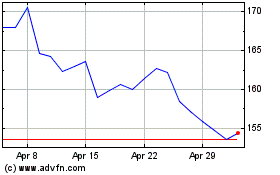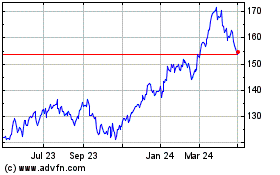Biden Trade Nominee Seeks Solution for Boeing-Airbus Dispute
February 25 2021 - 3:09PM
Dow Jones News
By Yuka Hayashi
WASHINGTON -- President Biden's pick for United States Trade
Representative said she would accelerate negotiations with the
European Union to resolve a longstanding dispute over
commercial-aircraft subsidies, citing the fight's negative impact
across several industries.
Speaking at her confirmation hearing Thursday before the Senate
Finance Committee, Katherine Tai, a veteran government trade
lawyer, said the 16-year-old dispute over how governments subsidize
Boeing Co. and Airbus SE has led to counter-tariffs -- sanctioned
by the World Trade Organization -- on food and beverage products,
causing "disruption" and "pain."
"At the core of this...is the need for the U.S. and the EU to
come together to figure out an answer," Ms. Tai said. "I would very
much be interested in figuring out how to land this particular
plane because it has been going on for a very long time."
Restaurant and beverage industries have been pushing for a
solution to the aircraft dispute, which has heaped pressure on
businesses already struggling with the Covid-19 pandemic. The Trump
administration imposed tariffs on $7.5 billion worth of European
wine and food items such as cheese and olives in late 2019. The EU
hit back with levies on U.S. whiskey, nuts and tobacco.
The EU's trade commissioner, Vladis Dombrovskis, called for a
mutual suspension of tariffs in the aircraft dispute this
month.
Ms. Tai is expected to receive Senate confirmation as she enjoys
support from lawmakers from both parties, as well as from business
groups and labor unions.
Ms. Tai has spent much of her career in the government, first as
a lawyer for the Office of the U.S. Trade Representative, then as a
congressional staff member. If confirmed, she would be the first
Asian-American and the first woman of color to serve in the
position.
Asked if she would consider lifting steel and aluminum tariffs
imposed by former President Donald Trump on America's allies, Ms.
Tai suggested a simple and immediate elimination of the duties is
unlikely, saying they should be dealt with as part of a broad
policy to address global oversupply of the metals.
Mr. Trump in 2018 imposed tariffs on about $50 billion of
imported steel and aluminum, calling the global oversupply of
metals a "threat to national security." The duties hit allies such
as the EU and Japan, not just China.
"We have to acknowledge that we have overall a very significant
global marketplace problem in the steel and aluminum that is driven
primarily by China's overcapacity," Ms. Tai told lawmakers. "What
we are going to need...is an effective solution that looks at a
whole slew of policy tools to address the problem."
Ms. Tai said tariffs are a "legitimate tool in the trade
toolbox."
Biden administration officials have said they would review all
tariffs and other trade policies introduced by Mr. Trump. Trade
experts say that rather than eliminating tariffs already in place,
the administration is likely to use them as leverage to win
concessions from trading partners.
Write to Yuka Hayashi at yuka.hayashi@wsj.com
(END) Dow Jones Newswires
February 25, 2021 14:54 ET (19:54 GMT)
Copyright (c) 2021 Dow Jones & Company, Inc.
Airbus (EU:AIR)
Historical Stock Chart
From Mar 2024 to Apr 2024

Airbus (EU:AIR)
Historical Stock Chart
From Apr 2023 to Apr 2024
